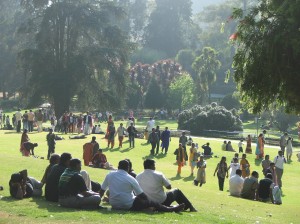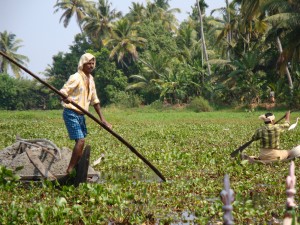Reflections – climate change
Because India normally has a reliable climate (unlike ours in the UK), variations are easier to spot. For us, the fact that we’re going to have snow tomorrow even though it’s late March isn’t necessarily indicative of anything: I remember in the year of the Isle of Wight Rock Festival (?1969?) we had a snow shower in AUGUST! And that was probably well before climate change had reached the scale it has today.
In India, however, these things show up. And they did. We were continuously reminded of changes that have taken place or continue to do so:
- In Ooty we were told that the crows in the botanic gardens were recent arrivals – they have only been arriving over the past 5 years or so. Before that, being 2,600 metres above sea-level, the climate was too cold for them.
- In Munnar the owner of the plantation residence told us that he was having to consider installing air-con in the chalets – they were only built a few years ago, but at the time they perceived no need for it as the weather was always cool.
- In Palakkad the temperature was 39degC and humidity was 98% – unheard of in March (and extremely uncomfortable).
- In Tamil Nadu we were told the monsoon, which normally runs from May to September, continued last year until late November – almost 3 months extra! – which jeopradised one of the rice crops.
- In Kumarakon we had to divert our boat journey because the lake was completely covered in water hyacinth – always a vigorous grower, but recently more so than ever before.
- And Nimmy Paul, in the cookery school in Cochin, told us that when she was a child they had a huge grapefruit tree in her mother’s garden – but now it is quite impossible to grow grapefruit in that region.
Everybody was aware of climate change. There is a significant agricultural element in India’s economy, of course, which makes it more immediate.
The jury might still be out on whether these changes are man-made or not, and whether we can do anything about it. But there was a definite feeling wherever we talked about it that the third world is suffering from past excesses of the developed world, and a resentment that the West is so reluctant to take the steps necessary to ameliorate things.
Just coming over the horizon, of course, is the next big crisis – water. Water shortages are exacerbated by climate change and will hit the poorest in the world first and hardest. This resentment will grow and could become quite poisonous.
Seen from an Indian perspective they really are the low-impact victims of high-impact indulgence. They don’t like it, and I’m sure we wouldn’t either. Added to the pivotal importance of water, there are political clouds on the horizon which could affect us all.

